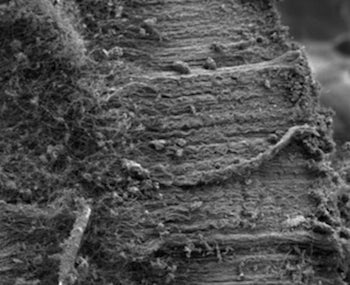
When they find their way into landfill, electronic waste like phones and computers can wreak havoc on groundwater supplies, contaminating them with toxic heavy metals like lead and mercury. Scientists at Rice University have come up with a new kind of filter made from carbon nanotubes and quartz fibers claimed to cleanse water of 99 percent of these types of metals. What’s more, they can be washed out and used over and over.
The new filters use quartz fibers as a substrate and the carbon nanotubes are then grown on top of them and treated with an oxidizing agent. This final step is what gives the material its supreme metal-soaking ability, according to the researchers.

An electron microscope image shows the filter’s quartz fibers with carbon nanotubes grown in place. (Credit: Barron Research Group).
The team put their filters to the test in the lab, up against water samples contaminated with things like cadmium, cobalt, copper, mercury, nickel and lead. It proved capable of treating five liters (1.3 gal) of water in less than a minute, and then washed clean with vinegar in 90 seconds to be used once again. The team says this step does not affect its ability to soak up the metals.

The quartz fiber and carbon nanotube filter, before and after soaking up toxic metals. (Credit: Barron Research Group).
Because the raw materials needed for the filter are inexpensive and producing vinegar is straightforward and commonplace around the globe, the team says that the approach could find use in remote locations. They calculate that a single gram of the material could treat 83,000 L (22,000 gal) of contaminated water to World Health Organization standards, which would be enough for the daily needs of 11,000 people.
“Every culture on the planet knows how to make vinegar,” said Rice University chemist Andrew Barron. “This would make the biggest social impact on village-scale units that could treat water in remote, developing regions. However, there is also the potential to scale up metal extraction, in particular from mine wastewater.”
The research was published in the journal Scientific Reports.
Source: Rice University








